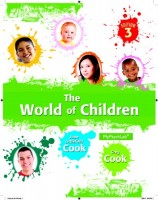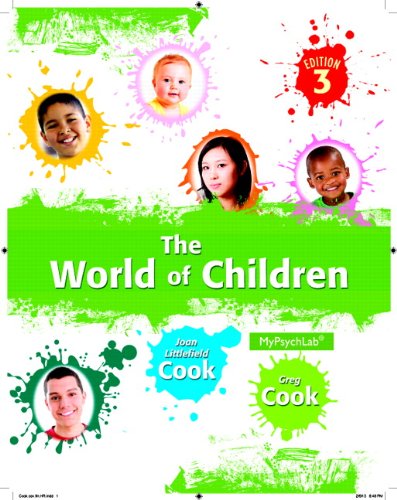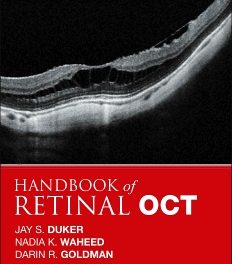 Authors: Joan Littlefield Cook and Greg Cook
Authors: Joan Littlefield Cook and Greg Cook
Publisher: Pearson (www.pearsonhigher.com) – 603 pages
Book Review by: Sonu Chandiram
The authors write that their three basic goals in working on this book were to:
- Focus on real people facing real issues
- Teach students to think critically about the research
- Help students make connections between science and practice
This book of 15 chapters has been written with these objectives in mind while taking into account the different stages of development from infancy through adolescence. The sections within it are organized around these five basic life stages:
- Beginnings – exploring child development; heredity and the environment; and prenatal development and birth
- Infants and Toddlers (birth through 2 years) – physical development in infants and toddlers; cognitive development in infants and toddlers; and socioemotional development in infants and toddlers
- Early Childhood – physical development in early childhood; cognitive development in early childhood; socioemotional development in early childhood
- Middle Childhood – physical development in middle childhood; cognitive development in middle childhood; socioemotional development in Middle childhood
- Adolescence – physical development in adolescence; cognitive development in adolescence; socioemotional development in adolescence.
Prior to reading this book by turning to the Contents page and to the first chapter, we urge you to go to the How to Use This Book section.
This book is unique from all others I have reviewed in the fact that each chapter begins with a story of life from another person’s perspective – a real, often challenging situation that shows you how child development relates to you or to the people around you.
In addition, you can watch videos with these individuals and learn more about their situations and what steps they took to overcome their challenges. These videos can be found at www.MyPsychLab.com.
Each of these stories is linked to Think About… margin questions placed at critical points throughout the chapter.
- Think About – questions ask you how you might advise people described in the opening story based on what you have learned thus far. By the time you finish studying the chapter, you should have a good idea about how to answer all the questions.
- Thinking Back to – at the end of each chapter, Thinking Back to summarizes some of the possibilities for how you could have answered the margin questions – but try answering the questions yourself before checking the authors’ summary.
- Thinking Critically – the authors include several other perspectives as well to help you think about the content from personal, professional, and social policy points of view. To support the personal perspective, the authors offer the following: Thinking Critically notes in the margins where you can stop and think about how the chapter material relates to your life.
Throughout each chapter, you will be reminded by the following icons to go online for additional study and practice within MyPsychLab:
- Listen
- Watch
- Explore
- Simulate
Videos, animations, simulations and other tools help you to better understand the concepts presented in the chapter you are in, while practice quizzes and a personalized study plan help you prepare for your exams.
To help you understand the professional, personal, and social perspectives within the field, all the chapters have each of these perspectives.
At the end of each section, you will find Let’s Review questions to help make sure you’ve mastered the material. The Chapter Review reminds you of the main questions addressed in the chapter. Each chapter also contains a Revisiting Themes section, where the four new research themes (nature/nurture interaction, neuroscience, diversity and multiculturalism, and positive development/resilience) can be found in each chapter.
About the Authors
Joan Littlefield Cook is the campus Director of Academic Assessment at the University of Wisconsin – Whitewater, where she is also a professor of psychology and has served as chairperson of the psychology department. She majored in psychology at Tennessee Technological University and later earned her Master’s degree and a PhD at Vanderbilt University. Over the past 26 years she has taught courses related to child and adolescent development, educational psychology, and cogniti9ve psychology at University of Wisconsin – Whitewater, the University of Wisconsin – Madison, and Middle Tennessee State University. She has coauthored three other books and numerous instructional materials.
Greg Cook is the Associate Vice Chancellor for Academic Affairs at the University of Wisconsin – Whitewater, where he has also served in the Dean’s office, as a professor of psychology, department chair, and campus director of academic assessment. Greg majored in psychology at the University of Dayton and later received his PhD in psychology at Vanderbilt University. For the past 27 years he has taught courses in child development, research methods, statistics, and related topics at Whitewater as well as at Vanderbilt University and at the Madison and Richland Center campus in the University of Wisconsin system. At Whitewater Greg received a college award and departmental award for teaching excellence.






